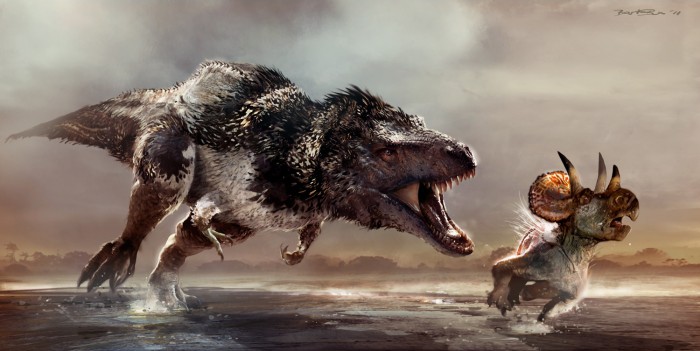Interview: Colin Trevorrow On Jurassic World Easter Eggs, Editing With Spielberg, Working At SNL
Jurassic World is finally hitting theaters today, and as promised, here is my final interview with director Colin Trevorrow about the movie. As many of you know, I have talked to Colin two other times during the production of the film, once about the information leaks and fan backlash to some of those details and another time in an extensive interview when I visited the set of the film. My latest interview with Colin was conducted at the junket on the Universal back lot last week after having seen the movie.
In the interview, Colin talks about the Flight of the Navigator remake, how the voice cameos in the movie came about, the ideas of commercialization and sequels in the movie, how Steven Spielberg helped change the edit of the movie, the fan reaction to the trailers and the struggle to preserve surprises, how he met his writing partner Derek Connolly while working at Saturday Night Live, featherless dinosaurs in an age when science thinks different, and would he be interested in directing a Star Wars movie.
After the jump, you can read the whole interview (a couple of excerpts have run earlier in the week) which is virtually spoiler free (I have removed one question and answer which I will run next week after everyone has seen the film).
 Peter Sciretta: (referring to the Jurassic World security command center backdrop in the room where we conducted the interview) This is really cool. Colin Trevorrow: You remember this stuff. You were there. That's all the same graphics, same footage that we had up on the wall.Peter Sciretta: That is cool. Very cool. I think this is like the third or fourth time I've talked to you about this movie.Colin Trevorrow: It's been a long two and a half years as we've been through so much together.
Peter Sciretta: (referring to the Jurassic World security command center backdrop in the room where we conducted the interview) This is really cool. Colin Trevorrow: You remember this stuff. You were there. That's all the same graphics, same footage that we had up on the wall.Peter Sciretta: That is cool. Very cool. I think this is like the third or fourth time I've talked to you about this movie.Colin Trevorrow: It's been a long two and a half years as we've been through so much together.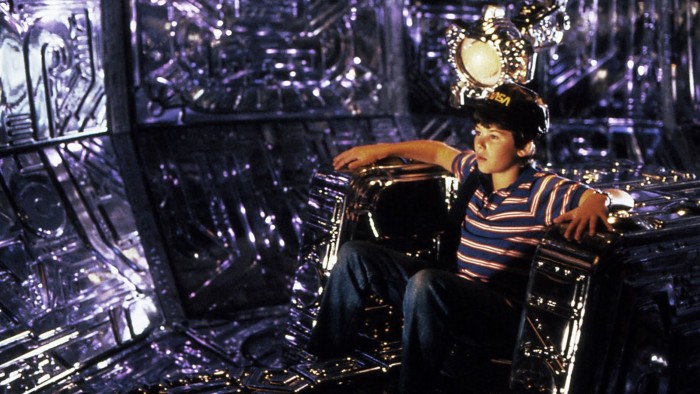 Peter Sciretta: First off, before I talk Jurassic World, I hate to be annoying blogger person that sounds like he's trying to get a scoop or whatever but I'm a huge fan of Flight of the Navigator. So I have to ask you what's going on with that? Colin Trevorrow: You know, I haven't thought about it for quite... Derek and I did a draft of that and it was just one of those things that I don't know if they're still developing it. I know they were thinking of doing it for a while and I wonder if the priorities of Disney have just changed or evolved. You know, that was pre, Marvel expanding universe, pre Star Wars. There's a lot of things that have changed over there. So I don't know what's going on with that one. I know that I probably only if at all I only have one more make a movie from my childhood card to play. So I may hold it.Peter Sciretta: What was your unique take on that since it sounds like it's maybe not happening?Colin Trevorrow: It was about brothers. I remember what the themes of it were. It was, maybe we didn't change it enough. I found actually that movie to be, that movie didn't make a lot of money. It's something that we loved 'cause we saw it at a certain time, but I found a lot of the elements in that movie to be pretty great. And we made it a little that we got off the planet a little bit and we made it different in scope. And in the end, it was about those brothers. But I honestly it was so much has happened since then that I'd have to go back and look at what we did.Peter Sciretta: Yeah, you've been on this for a while.Colin Trevorrow: Yeah.
Peter Sciretta: First off, before I talk Jurassic World, I hate to be annoying blogger person that sounds like he's trying to get a scoop or whatever but I'm a huge fan of Flight of the Navigator. So I have to ask you what's going on with that? Colin Trevorrow: You know, I haven't thought about it for quite... Derek and I did a draft of that and it was just one of those things that I don't know if they're still developing it. I know they were thinking of doing it for a while and I wonder if the priorities of Disney have just changed or evolved. You know, that was pre, Marvel expanding universe, pre Star Wars. There's a lot of things that have changed over there. So I don't know what's going on with that one. I know that I probably only if at all I only have one more make a movie from my childhood card to play. So I may hold it.Peter Sciretta: What was your unique take on that since it sounds like it's maybe not happening?Colin Trevorrow: It was about brothers. I remember what the themes of it were. It was, maybe we didn't change it enough. I found actually that movie to be, that movie didn't make a lot of money. It's something that we loved 'cause we saw it at a certain time, but I found a lot of the elements in that movie to be pretty great. And we made it a little that we got off the planet a little bit and we made it different in scope. And in the end, it was about those brothers. But I honestly it was so much has happened since then that I'd have to go back and look at what we did.Peter Sciretta: Yeah, you've been on this for a while.Colin Trevorrow: Yeah.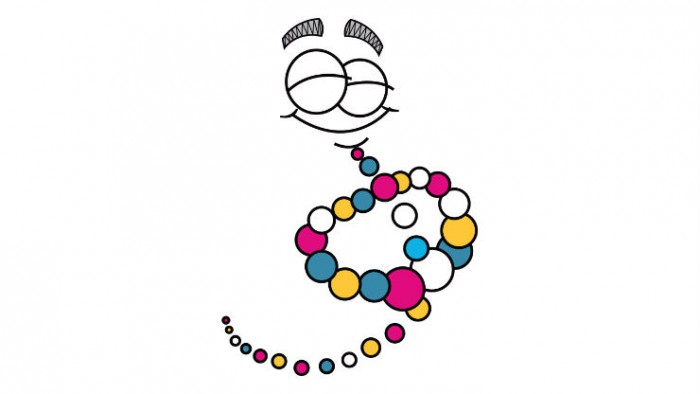 Peter Sciretta: I noticed in the credits that there's a few cameos, or at least voice cameos. [Note: this is not something most people could possibly notice when watching the film]Colin Trevorrow: Yeah.Peter Sciretta: I was wondering if you could tell us about those and how those came about?Colin Trevorrow: Brad [Bird] is one of them and he's been a great mentor and friend. And he actually invited me to the set of Tomorrowland. And allowed me just to kind of watch him for a couple days. And he gave me great confidence that I at least understood what a day to day experience on a giant blockbuster movie is for a director and we both mixed up at Skywalker Ranch. And he was up there ahead of me and they were doing some pre-dubbing stuff. And I asked if he would be the guy. And I remember writing him a detailed character description of who that guy was. He worked on the tram and he lives in North Hollywood and writes screenplays at night. Yeah, I had this whole thing that I laid out as like just put that into the character. And he did it. And the other one that you're probably referring to is me as Mr. DNA. Which again was something that happened very organically. We were–
Peter Sciretta: I noticed in the credits that there's a few cameos, or at least voice cameos. [Note: this is not something most people could possibly notice when watching the film]Colin Trevorrow: Yeah.Peter Sciretta: I was wondering if you could tell us about those and how those came about?Colin Trevorrow: Brad [Bird] is one of them and he's been a great mentor and friend. And he actually invited me to the set of Tomorrowland. And allowed me just to kind of watch him for a couple days. And he gave me great confidence that I at least understood what a day to day experience on a giant blockbuster movie is for a director and we both mixed up at Skywalker Ranch. And he was up there ahead of me and they were doing some pre-dubbing stuff. And I asked if he would be the guy. And I remember writing him a detailed character description of who that guy was. He worked on the tram and he lives in North Hollywood and writes screenplays at night. Yeah, I had this whole thing that I laid out as like just put that into the character. And he did it. And the other one that you're probably referring to is me as Mr. DNA. Which again was something that happened very organically. We were–
[This is where my iPhone stopped recording for the first time in the history of me using the device to record interviews. I was able to notice this before the next question but do not have a transcript of the rest of this answer, so I'll just tell you what he said: He recorded the voice for Mr. DNA as a scratch track, much like how animators do that for animated features. The sound guy put a few effects on his voice and it ended up sounding so close to the original that they decided not to rerecord with an actor. So while it wasn't planned, the director has a voice cameo in the movie as Mr. DNA]
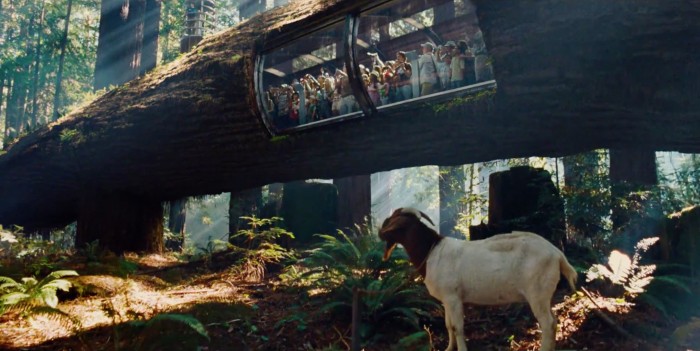 Peter Sciretta: The movie is a sequel and a reboot but it also is a commentary on sequels and reboots and over commercialization. Can you talk about that and did the studio ever push back on some of this meta commentary?Colin Trevorrow: Yes. You know, we had a lot of different themes that we wanted to address in this movie. And I really needed it to be about something for it to have a reason to exist. And how we got it past Universal I think suggests that they were policing our ideas in a way that they just weren't. Universal was extremely supportive throughout this whole process for us to make the kind of movie we wanted to make. And in the end I think we all, you know, there's a bit of a cynical exception and I guess it's probably based on true stories that have come out of these filmmaking processes that there's some kind of giant boardroom that's making creative decisions and sending them down. And that never happened. I'm not sure if I can recall a single studio note that I got on this whole movie. And part of it was because Steven [Spielberg] has final cut. And I answer directly to him. And he and I had a creative relationship on this film that was extremely positive and one that resulted in a movie that I think takes certain creative risks that may or may not have been possible if that wasn't the dynamic.
Peter Sciretta: The movie is a sequel and a reboot but it also is a commentary on sequels and reboots and over commercialization. Can you talk about that and did the studio ever push back on some of this meta commentary?Colin Trevorrow: Yes. You know, we had a lot of different themes that we wanted to address in this movie. And I really needed it to be about something for it to have a reason to exist. And how we got it past Universal I think suggests that they were policing our ideas in a way that they just weren't. Universal was extremely supportive throughout this whole process for us to make the kind of movie we wanted to make. And in the end I think we all, you know, there's a bit of a cynical exception and I guess it's probably based on true stories that have come out of these filmmaking processes that there's some kind of giant boardroom that's making creative decisions and sending them down. And that never happened. I'm not sure if I can recall a single studio note that I got on this whole movie. And part of it was because Steven [Spielberg] has final cut. And I answer directly to him. And he and I had a creative relationship on this film that was extremely positive and one that resulted in a movie that I think takes certain creative risks that may or may not have been possible if that wasn't the dynamic.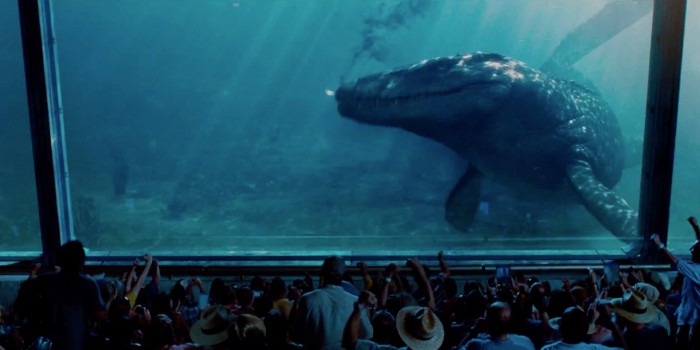 Peter Sciretta: On set you told us the story about how Steven suggested the idea for the water sequence, about how the bleachers hydraulically drop down below the tank to allow the audience to watch the dino eat the shark. I thought that was such a cool like little plus that he put on that sequence.Colin Trevorrow: The yes and in improv terms. Yeah.Peter Sciretta: Yeah. And I was wondering in post-production what was your experience with him? Like did he, do you have any stories of like how he affected the film?Colin Trevorrow: In post-production, it was really most about, mostly about cuts and my first director's cut was 2 hours and 10 minutes. And the movie now is, 2 hours. Maybe 1:57 if you're not counting the credits. And so that's a very small amount of editing to go on over of course from assembly. And it was really him holding my feet to the fire and pointing out that I didn't necessarily need every little bit of travel between one place or another. I remember there was a moment when we have a cut in the movie where it goes from a big dinosaur footprint after that scene with Bryce on the waterfall to the helmet with the scar and as the kid picks up the helmet. And it's a good cut. And in between that there used to be a moment that'll be on the DVD of the boys traveling together and so, you know, you don't need this. You don't need this. And it was like maybe 15 seconds long, 20 seconds long. And I said, no, but we won't know how they got there. And he said, no, logic is the enemy of storytelling. And I thought was like oh God, no, that's wrong. Like logic is crucial in storytelling. And as I thought about it more I realized what he was saying is that the audience is highly intelligent. And they will fill in those gaps and they will connect, you know, A to C without you necessarily including B. And, you know, that is that kind of thinking is what made it the movie that it is. I think it moves very well. And I think it has a propulsive intensity to it while also being very character focused and very performance based. And that I think is rare in a movie like this.
Peter Sciretta: On set you told us the story about how Steven suggested the idea for the water sequence, about how the bleachers hydraulically drop down below the tank to allow the audience to watch the dino eat the shark. I thought that was such a cool like little plus that he put on that sequence.Colin Trevorrow: The yes and in improv terms. Yeah.Peter Sciretta: Yeah. And I was wondering in post-production what was your experience with him? Like did he, do you have any stories of like how he affected the film?Colin Trevorrow: In post-production, it was really most about, mostly about cuts and my first director's cut was 2 hours and 10 minutes. And the movie now is, 2 hours. Maybe 1:57 if you're not counting the credits. And so that's a very small amount of editing to go on over of course from assembly. And it was really him holding my feet to the fire and pointing out that I didn't necessarily need every little bit of travel between one place or another. I remember there was a moment when we have a cut in the movie where it goes from a big dinosaur footprint after that scene with Bryce on the waterfall to the helmet with the scar and as the kid picks up the helmet. And it's a good cut. And in between that there used to be a moment that'll be on the DVD of the boys traveling together and so, you know, you don't need this. You don't need this. And it was like maybe 15 seconds long, 20 seconds long. And I said, no, but we won't know how they got there. And he said, no, logic is the enemy of storytelling. And I thought was like oh God, no, that's wrong. Like logic is crucial in storytelling. And as I thought about it more I realized what he was saying is that the audience is highly intelligent. And they will fill in those gaps and they will connect, you know, A to C without you necessarily including B. And, you know, that is that kind of thinking is what made it the movie that it is. I think it moves very well. And I think it has a propulsive intensity to it while also being very character focused and very performance based. And that I think is rare in a movie like this.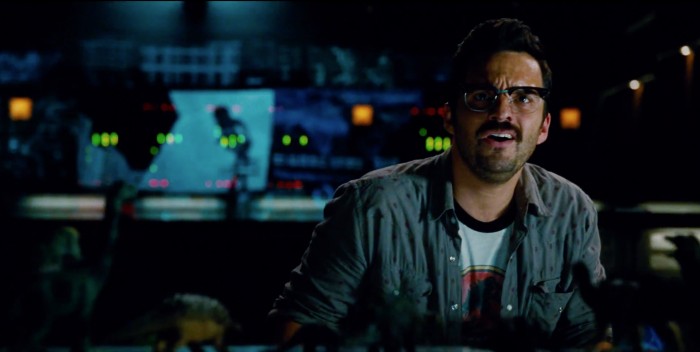 Peter Sciretta: Definitely. You mentioned deleted scenes. On set, Jake Johnson hinted that his character might have an encounter with a dinosaur.Colin Trevorrow: I think he was just joking.Peter Sciretta: Was he just making that up?Colin Trevorrow: Yeah.Peter Sciretta: That wasn't a deleted thing?Colin Trevorrow: No, that was never intended. He was always confined to that room unfortunately.
Peter Sciretta: Definitely. You mentioned deleted scenes. On set, Jake Johnson hinted that his character might have an encounter with a dinosaur.Colin Trevorrow: I think he was just joking.Peter Sciretta: Was he just making that up?Colin Trevorrow: Yeah.Peter Sciretta: That wasn't a deleted thing?Colin Trevorrow: No, that was never intended. He was always confined to that room unfortunately.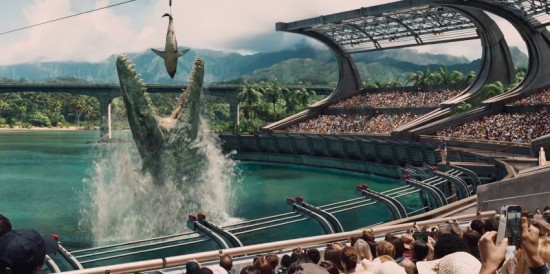 Peter Sciretta: Throughout this whole process I've been talking to you about the fan reaction from the development to the leaks to, you know, everything. So I feel like being here I have to ask you, there's like this fan reaction to the trailers and not so much the Joss Whedon tweet, but the reaction to the early C.G. in the trailers and how...Colin Trevorrow: The movie looked s***ty. And, you know, to me that process going through I was reacting to it as a fan as well. And I think, I'm sure when you saw it, probably the first thing that occurred to you, however you felt about the movie is this is not the movie that was in the trailers.Peter Sciretta: Yeah.Colin Trevorrow: At all. I knew that the whole time. And I thought, I had to take a certain amount of hits, a certain amount of bullets for this movie. Because I knew based on the ideas that we were allowing out there that you have Chris Pratt with his raptor buddies. You don't know the dynamics of how that changes. And how those allegiances and alliances change over the course of the movie. And I reached an interesting point and this is certainly since the last time we spoke where I started to embrace the lowered expectations that had been brought about by the trailers. And but only for a certain part of the audience were these lowered expectations. And I would actually argue that what marketing has done for a vast majority of the audience in this country and around the world has actually been really effective. For people who love movies and people who really care about cinema and think about it and write about it like you, I think that they presented a movie that looked like it was gonna be a giant hunk of s***. And it isn't. And so to me, as many of the surprises were taken away from me, I started to cling to this idea that the surprise of the movie is that it's good.Peter Sciretta: By the way, I loved the film. Just so you know, Not that that matters.Colin Trevorrow: Thank you. It does matter. What are you talking about, man? /Film is a big site and your opinion matters a lot.
Peter Sciretta: Throughout this whole process I've been talking to you about the fan reaction from the development to the leaks to, you know, everything. So I feel like being here I have to ask you, there's like this fan reaction to the trailers and not so much the Joss Whedon tweet, but the reaction to the early C.G. in the trailers and how...Colin Trevorrow: The movie looked s***ty. And, you know, to me that process going through I was reacting to it as a fan as well. And I think, I'm sure when you saw it, probably the first thing that occurred to you, however you felt about the movie is this is not the movie that was in the trailers.Peter Sciretta: Yeah.Colin Trevorrow: At all. I knew that the whole time. And I thought, I had to take a certain amount of hits, a certain amount of bullets for this movie. Because I knew based on the ideas that we were allowing out there that you have Chris Pratt with his raptor buddies. You don't know the dynamics of how that changes. And how those allegiances and alliances change over the course of the movie. And I reached an interesting point and this is certainly since the last time we spoke where I started to embrace the lowered expectations that had been brought about by the trailers. And but only for a certain part of the audience were these lowered expectations. And I would actually argue that what marketing has done for a vast majority of the audience in this country and around the world has actually been really effective. For people who love movies and people who really care about cinema and think about it and write about it like you, I think that they presented a movie that looked like it was gonna be a giant hunk of s***. And it isn't. And so to me, as many of the surprises were taken away from me, I started to cling to this idea that the surprise of the movie is that it's good.Peter Sciretta: By the way, I loved the film. Just so you know, Not that that matters.Colin Trevorrow: Thank you. It does matter. What are you talking about, man? /Film is a big site and your opinion matters a lot.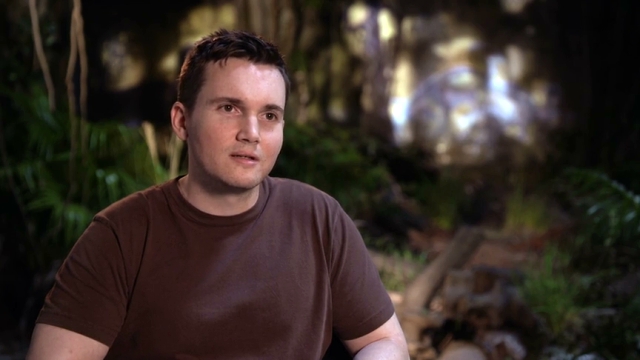 Peter Sciretta: Thanks. I wanna get away from Jurassic World for a second and talk about you and Derek [Connolly]. And your relationship. I read that it started off in an interesting place. How did you and Derek meet?Colin Trevorrow: We met, we were both at N.Y.U. and we were both interns on Saturday Night Live. And simultaneously, you know, I didn't see him as much at S.N.L., 'cause he was in a different department than I was. But we–
Peter Sciretta: Thanks. I wanna get away from Jurassic World for a second and talk about you and Derek [Connolly]. And your relationship. I read that it started off in an interesting place. How did you and Derek meet?Colin Trevorrow: We met, we were both at N.Y.U. and we were both interns on Saturday Night Live. And simultaneously, you know, I didn't see him as much at S.N.L., 'cause he was in a different department than I was. But we–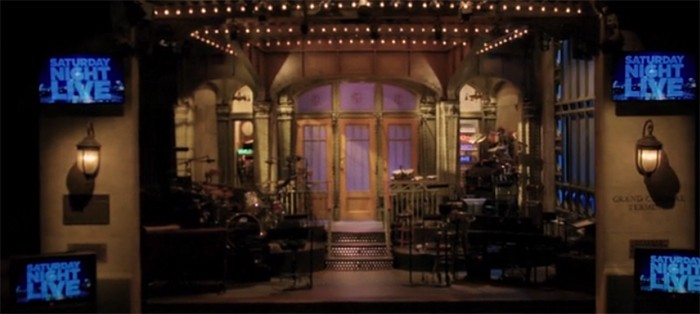 Peter Sciretta: What were you doing there?Colin Trevorrow: I was in the talent department. So I would like if somebody would come in, I would if it was like a guest, I would make sure that they were happy. I remember having to kind of hang out with Gary Coleman for a day. I remember Quentin Tarantino telling me to go back to his hotel room and get his notebook and in his notebook were all the notes for Kill Bill. And I knew it and I didn't look at them, 'cause I had, you know, great honor amongst thieves, you know. And Derek was in the film unit that would go out and do the interstitial film stuff. And he and I were in a comedy writing class together that was written, it was taught by a guy who wrote on Herman's Head. I remember that very specifically. And we would just crack each other up. And I would do the voices for his sketches. And we made each other laugh. And over time we recognized that, you know, he and I have very different skill sets. Completely different. And he has an ability to if I give him a scene and say this is what needs to happen in this scene, his version of that scene will be unlike anything anyone's going to write. And, I mean, it'll feel like Jurassic World does. You know, a lot of that dialogue is Derek Connolly. In the end, we end up writing about 50/50 from a dialogue standpoint. But all the stuff you love is his. And that relationship is one that has grown richer with time and will continue to evolve and grow. I get very reflective when I talk about Derek. It's a relationship that means more and more to me as the years go by. And I realize how valuable it is. And I'm so proud of what we've done here.
Peter Sciretta: What were you doing there?Colin Trevorrow: I was in the talent department. So I would like if somebody would come in, I would if it was like a guest, I would make sure that they were happy. I remember having to kind of hang out with Gary Coleman for a day. I remember Quentin Tarantino telling me to go back to his hotel room and get his notebook and in his notebook were all the notes for Kill Bill. And I knew it and I didn't look at them, 'cause I had, you know, great honor amongst thieves, you know. And Derek was in the film unit that would go out and do the interstitial film stuff. And he and I were in a comedy writing class together that was written, it was taught by a guy who wrote on Herman's Head. I remember that very specifically. And we would just crack each other up. And I would do the voices for his sketches. And we made each other laugh. And over time we recognized that, you know, he and I have very different skill sets. Completely different. And he has an ability to if I give him a scene and say this is what needs to happen in this scene, his version of that scene will be unlike anything anyone's going to write. And, I mean, it'll feel like Jurassic World does. You know, a lot of that dialogue is Derek Connolly. In the end, we end up writing about 50/50 from a dialogue standpoint. But all the stuff you love is his. And that relationship is one that has grown richer with time and will continue to evolve and grow. I get very reflective when I talk about Derek. It's a relationship that means more and more to me as the years go by. And I realize how valuable it is. And I'm so proud of what we've done here.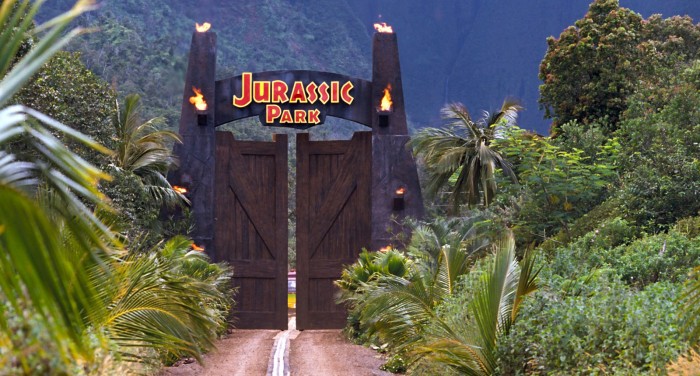 Peter Sciretta: I think it's interesting also that, a lot of people made a big thing of you being a newcomer coming to Jurassic World. But you not only are you handed the keys to the kingdom, but you were able to get Derek to come along with you. How did that happen?Colin Trevorrow: Well because he wrote Safety Not Guaranteed and he won awards for doing so, and he then had gone off to Pixar and was writing at Pixar on a movie, he was probably less of an unproven entity than I was to a certain extent. And yeah, you know, I kind of, I came in pretty hot on this one. And I said, I felt very confident that I knew how to make this dinosaur movie in the same, and I think I said this to you before, like if someone asked you, make a Jurassic Park movie. Yeah, I'll make you a Jurassic Park movie. Don't you worry about that. And so I had that kind of like very childlike confidence. And there was like I swear, like I remember calling him and it was like we were just such nerds. Like Derek, I'm putting together a very special team and we're gonna go in and we're gonna write this thing. And we did. And we tackled it with such aggression. It was like just hungry animals, we were thrown a steak. [MAKES NOISES] And just like tore it apart. And, you know, and this is what you get.
Peter Sciretta: I think it's interesting also that, a lot of people made a big thing of you being a newcomer coming to Jurassic World. But you not only are you handed the keys to the kingdom, but you were able to get Derek to come along with you. How did that happen?Colin Trevorrow: Well because he wrote Safety Not Guaranteed and he won awards for doing so, and he then had gone off to Pixar and was writing at Pixar on a movie, he was probably less of an unproven entity than I was to a certain extent. And yeah, you know, I kind of, I came in pretty hot on this one. And I said, I felt very confident that I knew how to make this dinosaur movie in the same, and I think I said this to you before, like if someone asked you, make a Jurassic Park movie. Yeah, I'll make you a Jurassic Park movie. Don't you worry about that. And so I had that kind of like very childlike confidence. And there was like I swear, like I remember calling him and it was like we were just such nerds. Like Derek, I'm putting together a very special team and we're gonna go in and we're gonna write this thing. And we did. And we tackled it with such aggression. It was like just hungry animals, we were thrown a steak. [MAKES NOISES] And just like tore it apart. And, you know, and this is what you get.
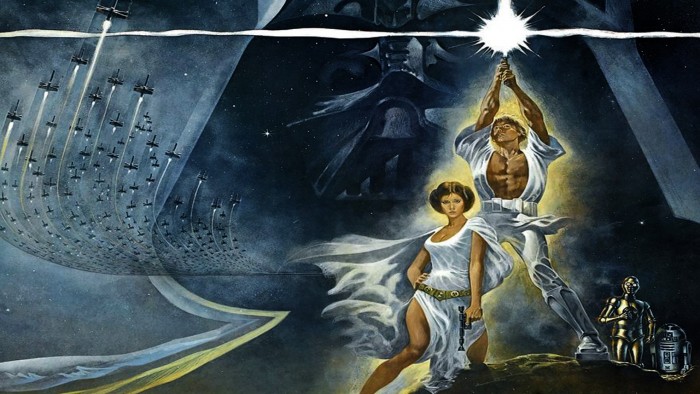 Peter Sciretta: One last question. This is maybe a little digging of a question, but you got involved in this property because they wanted Brad [Bird] to do Star Wars and he suggested you as his guy to like–Colin Trevorrow: You guys finally broke that story.Peter Sciretta: Yeah, that, Frank [Marshall] told us that story.Colin Trevorrow: Right.Peter Sciretta: I was wondering now that this is over and you're done directing Jurassic World, would you ever like to direct a Star Wars film?Colin Trevorrow: Yeah, I can't say no to that idea. Look, I think you'd know I was lying if I said I would never ever do a Star Wars film. I could tell you absolutely, 100 percent for sure I'm not doing or involved in the Boba Fett one. And I'm sure they'll find a great filmmaker to do it. And I'm so impressed with the choices they have made. And I think specifically Rian Johnson is such an awesome filmmaker. And I'm so excited to see what he does.
Peter Sciretta: One last question. This is maybe a little digging of a question, but you got involved in this property because they wanted Brad [Bird] to do Star Wars and he suggested you as his guy to like–Colin Trevorrow: You guys finally broke that story.Peter Sciretta: Yeah, that, Frank [Marshall] told us that story.Colin Trevorrow: Right.Peter Sciretta: I was wondering now that this is over and you're done directing Jurassic World, would you ever like to direct a Star Wars film?Colin Trevorrow: Yeah, I can't say no to that idea. Look, I think you'd know I was lying if I said I would never ever do a Star Wars film. I could tell you absolutely, 100 percent for sure I'm not doing or involved in the Boba Fett one. And I'm sure they'll find a great filmmaker to do it. And I'm so impressed with the choices they have made. And I think specifically Rian Johnson is such an awesome filmmaker. And I'm so excited to see what he does.

